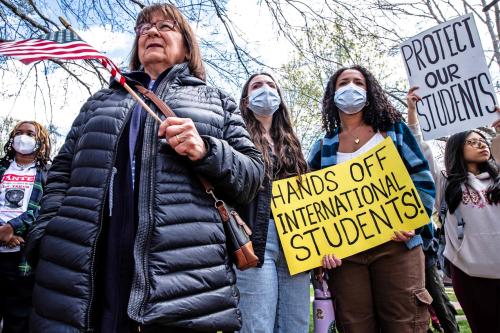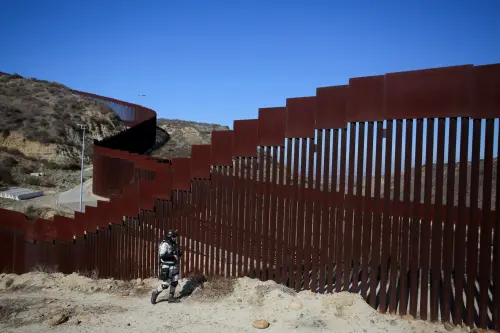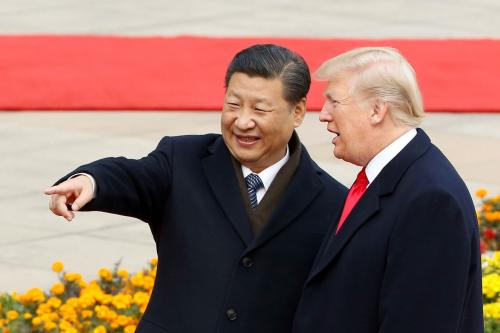The last year has seen a deepening authoritarian turn in China, including a push toward mass surveillance, a piloted “social credit” system, and well-documented reports of large-scale repression of the Uighur minority in Xinjiang province. U.S. rhetoric and policy toward China also has shifted significantly, challenging Chinese policy in realms from trade and investment to security and political influence.
On October 18, the Brookings Project on International Order and Strategy and John L. Thornton China Center hosted a discussion of how ideology and values could impact competition between the United States and China. Brookings scholars Tarun Chhabra, Ryan Hass, and Ted Piccone were joined in discussion by Hal Brands of the Kissinger Center for Global Affairs at Johns Hopkins SAIS and Emily Rauhala of The Washington Post.
IDEOLOGY AND GEOPOLITICAL COMPETITION
Tarun Chhabra opened the discussion with reference to Vice President Mike Pence’s October 4 speech on China. Chhabra noted that while the vice president’s speech “reinforced the [Trump] administration’s move in its 2017 National Security Strategy to describe China as a strategic competitor,” the “role that ideology and values will play as U.S.-China competition intensifies” has received less attention.
For Hal Brands, Sino-American competition already entails a clash between “liberalism and democracy, and illiberalism and authoritarianism.” This clash “between those two sets of systems and values” is “far more central” to this competition than generally appreciated. Differing Chinese and American views on the relationship of “the individual to the state, or of society to the state, fosters mistrust,” not least because both governments seek to fashion an international order in which their system and values can survive and prosper.
https://www.youtube.com/watch?v=SBq8_mQ8DdE?start=277&end=339
EXPORTING THE CHINESE MODEL?
Do these divergent ideologies destine the United States and China to clash? Ryan Hass argued that the Chinese Communist Party “wants to protect its own form of governance.” It is “ruthlessly opportunistic” in seeking to advance its interests around the world; however, it probably does not have a “master strategy” for turning the world into a likeness of itself. A “China model” is not exportable, he argued, but rather “the product of 5,000 years of civilization, a unique governance tradition, and the hard work of 1.4 billion people.”
Ted Piccone, however, asserted that while countries naturally seek to protect their interests on the international stage, particularly in multilateral fora like the United Nations, Beijing is undertaking a “much more offensive play in which China is, with great confidence, projecting and inserting its own values into international human rights resolutions and discourse.” China has “for many years used the U.N. system to block any criticism of its own behavior internally,” Piccone noted. What is new today, however, is that a more economically powerful Beijing is “going after some of the fundamental pillars of the international human rights system as it has evolved over the last several decades.”
https://www.youtube.com/watch?v=SBq8_mQ8DdE?start=1072&end=1157
Citing the Chinese Communist Party’s perceived threat from independent press reporting on corruption implicating senior Chinese officials and the awarding of the Nobel Prize by the independent Nobel committee to the late Chinese dissident Liu Xiaobo, Chhabra asked whether the U.S. and Chinese models are bound to clash irrespective of official government intentions.
Based on her reporting, Emily Rauhala agreed that, regardless of Beijing’s intentions, its authoritarian-oriented ideas and technological applications are finding demand globally. “Censorship technology” associated with mass social surveillance is “being exported,” alongside the idea of “internet sovereignty, that every country should and must, for the safety of its people, control the sphere of information” available to its public.
THE NATURE OF COMPETITION
Turning to U.S. policy, the panel considered whether ideological competition should be emphasized as a major dimension of American strategy toward China. Chhabra suggested that Chinese leader Xi Jinping had already highlighted this dimension of Sino-American competition by heralding “the China model” in his 2017 speech to the 19th Chinese Communist Party Congress.
Rauhala warned that a “cold war framing” would be “bad strategy,” not least because it might be seen to validate official Chinese propaganda portraying the United States as “a war-like country that seeks to contain China and wants to thwart [China’s] natural rise.” For Brands, the United States should not shrink from “making [Sino-U.S. competition] about ideology.” Throughout American history, Brands argued, “there has always been an ideological aspect to U.S. competitions with other major powers,” stretching back to the Revolutionary War. An ideological dimension—demonstrating that a challenge “threatens not just American geopolitical, or American economic interest, but threatens our view of…democracy and human rights”—has often proven necessary to “mobilize the American public.”
Hass said that if the goal of U.S. strategy is to “mobilize the American public for an unvarnished adversarial relationship with China,” then it would make sense to emphasize ideology; but if the goal is to make progress on specific priorities, then such an approach could prove counterproductive. Piccone agreed that there are several “important issues on the bilateral agenda that need to be worked through, and [we are] better off doing that in a more pragmatic way.”
Nonetheless, Piccone underscored the need to both maintain bilateral space for cooperation, while also recognizing the emergence of a more globally assertive China, “especially economically, but also militarily” and even “on soft power terms.” In studies of China’s growing influence in Latin America, Piccone, along with Brookings colleagues David Dollar and Harold Trinkunas, has found that Beijing “has become more of an enabler, and a facilitator, of bad behavior that was already going on.”
https://www.youtube.com/watch?v=SBq8_mQ8DdE?start=3063&end=3123
The panel then turned to discussion of which, if any, aspects of Beijing’s regional and global ambitions the United States should seek to challenge. Chhabra also asked whether the United States should, as Brands has written, consider ways to “exploit the weaknesses…within the Russian and Chinese political systems.” Brands suggested this is a “question we should be taking more seriously than we have today,” meriting more systematic study of potential costs and benefits.
Hass observed that active efforts by the United States government to destabilize China’s internal affairs would represent “an extraordinary decision” that would “fundamentally transform the U.S.-China relationship,” and also judged that present circumstances did not justify such an approach. Both Brands and Hass agreed that the gravity of such a move would demand “serious, sober, thoughtful perspective.” For Piccone, the United States should focus on countering authoritarianism by “strengthening democracies around the world, and getting them to work properly…and deliver benefits to their people.”
Emma Bates, a research and events intern with the Project on International Order and Strategy, contributed to this post.
The Brookings Institution is committed to quality, independence, and impact.
We are supported by a diverse array of funders. In line with our values and policies, each Brookings publication represents the sole views of its author(s).





Commentary
How will values shape U.S.-China competition?
November 27, 2018